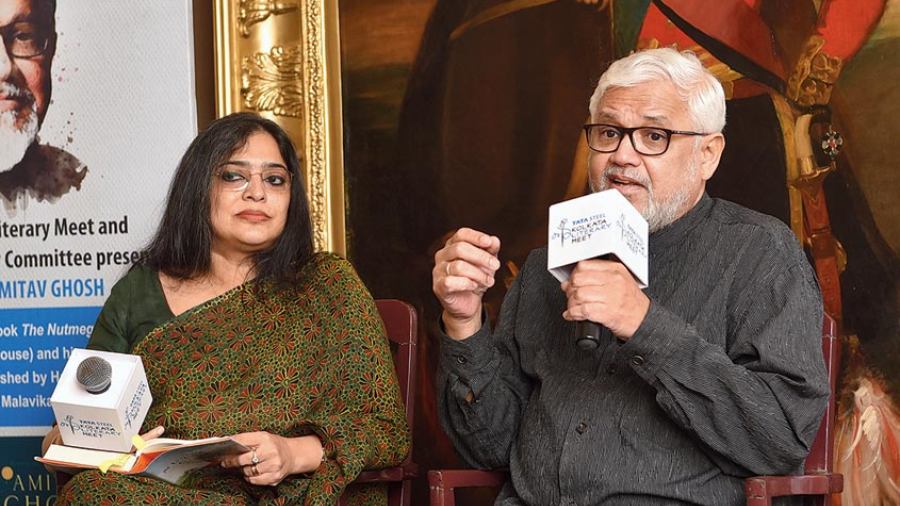Kolkata Literary Meet and The Bengal Club Library Committee presented a wonderful afternoon of conversations and books with author Amitav Ghosh. Titled ‘Brunch with Amitav Ghosh’, May 8 saw the dining hall of The Bengal Club abuzz with excitement to hear the Jnanpith awardee speak about his books The Nutmeg’s Curse: Parables for a Planet in Crisis and his forthcoming title The Living Mountain, all set to release on May 12. In conversation with festival director Malavika Banerjee, the author was glad to be back in the city after the cruel pandemic that took away his mother.
He spoke of the inception of his novel The Nutmeg’s Curse, which began with an invitation extended by the Indonesian government to the author to tour the country. “I believe Indonesia is the most interesting country in the world and I have loved travelling through it. However, the one place I had never been to was the spice islands, that is Maluku,” he said. Communal riots between Muslims and Christians rendered travel impossible to the islands till 2012. So the author jumped at the idea of finally getting to travel there in 2016. The original island of cloves –– Ternate and Tidore –– welcomed him. The history of spices enamoured the author whose texts have always been rich with historical records. “That’s the great thing about writing travelogues, the land teaches you so much. The enormity of what had happened in these islands really dawned on me,” he said.
Nature has played a character stronger than protagonists in Ghosh’s books and his firm belief in the humanisation of nature was prevalent in his conversation with Banerjee as well. Recounting the history of the spice islands, he spoke of the Portuguese who wanted to monopolise the spice trade in the 1600s. “Every time the volcano saw the Dutch ships, it exploded,” he laughingly said. This thought was further reiterated when Ghosh spoke about the Dutch conquest of the Banda Islands where nutmeg was cultivated. “In every culture, there is a tree of life and for the Bandanas, this was a tree of prosperity. But eventually, it turned into the most dreadful curse as Bandanas people were murdered and plundered for it,” he said.
The Dutch introduced a system of racialised capitalisation by introducing White planters on the land and shipped in slaves, mostly Indians, to operate the plantation system. Drawing parallels with the advent of the tea industry in India, the author summarised the inception and crux of his novel The Nutmeg’s Curse.
He spoke woefully about the pandemic that took away his mother from him. His inability to visit his family in Calcutta to share the grief haunts him as does his life at the peak of the pandemic in a home 10 minutes away from the epicentre of the disease –– Brooklyn hospital. “The streets of Brooklyn were completely empty and all we could hear were the sound of ambulances thundering down and catch sight of refrigerated trucks being gathered to store bodies. It was a strange time to have lived through,” he recalls. It was during this time that he stumbled upon a book on the Banda genocide from the late 19th century. But the book was in Dutch. “Never one to be defeated by languages”, he procured a PDF, sections of which he painstakingly put on Google Translate to decipher “secrets” that he was convinced “the book held”.
“It was at the intersection of two non-human entities –– the Internet and the coronavirus –– both operating at a globe scale, that sort of opened a window for me,” he said.
Terraforming forms a large portion of The Nutmeg’s Curse, a term that was coined in the 1940s. He speaks of Elon Musk and his hope to find livable land on Mars; of H.G. Wells who wrote about aliens exterminating human beings to adapt Earth according to their own needs; and of Tasmanian history that records the British doing this to them to adapt Tasmania for their own needs, as he begins to explain the process that is the word. “So the idea of terraforming has a very long colonial history. We think of colonialism as a process of domination over other humans but what is actually very interesting and very distinctive about New World colonisation is the use of non-human entities like diseases, deforestation or livestock”. He spoke of Bombay being one of the most terraformed places in India. They were six islands and in the late 18th century people started filling in the islands to make a peninsular area. “The curious thing is the continuity of this history and the present planetary crisis, it’s almost uncanny. The Amazon is our last hope and what does Bolsnaro want to do to it? He wants to take it down and introduce a monoculture of soya. And this soya is not because they want to grow soya. It’s because they want to grow cattle. You see the entire colonial logic playing out again in our era,” he says.
In his inimitable manner, he spoke of the catastrophic consequences that await humankind, the first seeds of which were planted in his book The Great Derangement. The conversations meandered on towards his new book and the most satisfying part of his writing experience. The video is available for viewing on Kolkata Literary Meet’s social media pages and it makes for a great watch while we wait for his next book to hit the stands this year.
Amitav Ghosh at Starmark

On his trip to Calcutta, the author also dropped into Starmark Bookstore, South City Mall, to sign copies of his book and interact with fans. We also caught a glimpse of the cover of his upcoming book The Living Mountain: A Fable for Our Times.

Pictures: Pabitra Das










